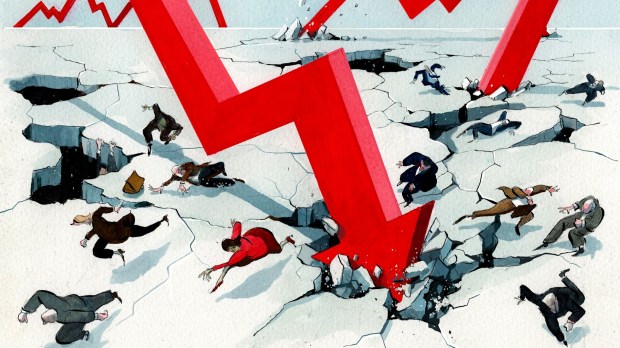Tesco chairman John Allan provoked feminist fury by telling would-be non-exec directors, ‘If you’re a white male, tough: you’re an endangered species’ — then claimed he was really trying to make the opposite point, that ‘it’s a great time for women’. But to the contrary, this was a week in which tough white males grabbed the corporate prizes, while one high-flying woman from an oppressed minority was hounded out of her job.
First, the blokes. HSBC announced, for the first time in its history and to the satisfaction of governance zealots, the appointment of an outside chairman. Incumbent Douglas Flint is to be succeeded by Mark Tucker, a former professional footballer who runs Hong Kong-based insurer AIA, sits on the board of Goldman Sachs, and is a former head of Prudential in London and Asia. One associate described him to me as an ‘intense, hard-driving, slightly oddball’ chief executive who may find it hard switching to the more diplomatic mode required, as chairman, to address HSBC’s lingering reputational problems. But being ‘phenomenally well connected’ around Asia, and having served on the Court of the Bank of England, will certainly help.
More testosterone at BT, too: the new chairman of the telecoms group — now wrestling with the separation of its Openreach broadband arm under regulatory orders — is the toughest of current FTSE company commanders, the South African Jan du Plessis. A specialist in what investors call ‘sin stocks’, having formerly led British-American Tobacco and the brewer SAB Miller, du Plessis will step down from the chair of mining giant Rio Tinto — leaving behind the untidiness of ‘Guineagate’ , the scandal in which Rio confessed to bribery in connection with an iron ore concession.
Du Plessis is widely admired for his results-driven, no-nonsense grip: his weak spot is that he can sometimes sound insensitive in matters of corporate responsibility. One example was his recent evidence to a Commons select committee, in which he justified ‘safety bonuses’ for senior Rio executives despite four deaths during the previous year by arguing that ‘an absolute requirement for zero fatalities’ in a dangerous industry would be ‘a trap of political correctness’. That was an even riskier remark than the Tesco chief’s clumsy defence of men.
Perils of privilege
Meanwhile, the head girl in the headlines was Charlotte Hogg, promoted last month from chief operating officer to Deputy Governor (Markets and Banking) at the Bank of England and tipped as a potential successor to Governor Carney, but forced to resign after the Treasury select committee declared her to have fallen short in ‘professional competence’. Her fault was that she had failed to disclose her younger brother Quintin’s job as a ‘director of corporate strategy’ at Barclays — for which she assumed regulatory responsibility in her new role.
As a breach of the Bank’s Code of Conduct, which she drafted, this was a serious error, deserving of the verbal reprimand she evidently received from the Governor. But neither the Court of the Bank nor Carney himself (who ‘deeply regretted’ her resignation) seemed to think it a ‘hanging offence’. No one suggested that an actual rather than potential conflict of interest had arisen as a result, nor that Hogg had engaged in any collusion with her sibling.
What really riled the likes of Labour select committee member John Mann were Hogg’s establishment connections: both her parents sit in the House of Lords, as did both grandfathers; her father is a former Tory minister, her aunt a high court judge. All of which provoked a tedious sermon against the perils of privilege by Guardian columnist Deborah Orr, asserting that Hogg’s ‘self-destructive behaviour was sadly predictable’ because her breed believe ‘they are the people who make the rules, not the people who follow them’. What rubbish; but ‘the privileged’ really are an endangered species, and it’s open season on them.
Lost treasure
I was sorry to hear that Christie’s is closing its South Kensington saleroom, a treasure cave of affordable antiques and collectables where I was an occasional underbidder in the era when I lived round the corner. Its demise has been on the cards ever since parts of its trade started to migrate online, and its specialist auctions — of everything from rugs to rock’n’roll memorabilia and teddy bears — were replaced by bland ‘Interiors’ sales, presumably aimed at the decorator market that flourishes with London’s endless residential property boom.
But the prime focus of the auction world these days is new-moneyed buyers in Asia and America, not ageing Lovejoys and catalogue-browsers in SW7. And I’m told the real driver of this decision was Christie’s owner François Pinault’s obsession with making his operation as lean in staff numbers as rival Sotheby’s. That’s why he hired new chief executive Guillaume Cerutti from Sotheby’s last December. Cerutti has taken less than three months to swing his axe.
Power games
It’s too late now, but I didn’t feel Charlotte Hogg made enough of her defence that until recently she didn’t even know what her brother did at Barclays. His own colleagues probably didn’t know either: operating somewhere below the board and executive committee where strategic decisions are really made, a ‘director of corporate strategy’ in an institution perpetually riven by power struggles is at best the equivalent of a powerless squire in Game of Thrones.
I speak from experience: for a few months long ago, I held the title of ‘head of international corporate finance’ in Barclays’ investment bank, but as far as I could ascertain it carried no authority at all. When a young man with a foreign accent stopped me in a corridor and said ‘You are my boss’, I could only reply, ‘Am I? Who are you? Who do you think I am?’ I never did find out.
Got something to add? Join the discussion and comment below.
Get 10 issues for just $10
Subscribe to The Spectator Australia today for the next 10 magazine issues, plus full online access, for just $10.
You might disagree with half of it, but you’ll enjoy reading all of it. Try your first month for free, then just $2 a week for the remainder of your first year.















Comments
Don't miss out
Join the conversation with other Spectator Australia readers. Subscribe to leave a comment.
SUBSCRIBEAlready a subscriber? Log in